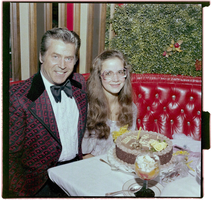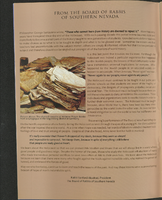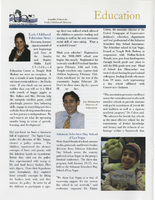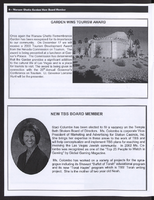Search the Special Collections and Archives Portal
Search Results

Photograph of Irwin Kishner and Sharon Kishner, February 18, 1979
Date
Archival Collection
Description
Photograph of Irwin Kishner and Sharon Kishner celebrating Sharon's 16th birthday. 120mm negative.
Image

Transcript of interview with Arthur "Art" Marshall by Claytee D. White, February 11, 2014
Date
Archival Collection
Description
Interview with Arthur "Art" Marshall by Claytee White on February 11, 2014. In this interview, Marshall
Arthur Marshall was born in 1929 in Cleveland, Ohio. He met his wife, Jayn in 1953, and the couple moved to Las Vegas where she already lived with her family. Art joined his father-in-law in the family's retail clothing business. Art Marshall took over the retail clothing business with his brother-in-law, Herb Rousso, and expanded operations as Marshall-Rousso stores. Art quickly became very active in the Jewish community upon arriving in Las Vegas. He served as president at Temple Beth Sholom, and worked with other Jews in the city, many who owned and managed the hotels at the time, to build a strong Jewish community in Las Vegas. He served as the chairman of Nevada State Bank and spent 12 years on the Nevada Gaming Commission.
Text

Dorothy Eisenberg interview, March 8, 2017: transcript
Date
Archival Collection
Description
Multicultural advancements in Las Vegas cannot be mentioned without speaking on the monumental contributions of Dorothy Eisenberg. From 1971 to 1998, she was involved with over 25 local organizations and committees and had the honor of having an elementary school named after her. Eisenberg’s beginnings start in the midst of the all American melting pot experience though immigration. Her mother came to the United States from Russia at age twelve and her father from Austria at age sixteen to go upholstery school. Upon marriage, they settled down in Philadelphia after the World War II. They raised Dorothy and her siblings to contribute to the community despite the anti-Semitism that was displayed there on a regular basis. Signs that said, “No dogs and Jews allowed” were common place. After her first husband died, leaving her as a single mother of four little girls, she didn’t allow herself to be trampled by her circumstances by enrolling in Temple University to be a teacher at a time when the university had stigma towards older students. Upon her marriage to her second husband, the family moved to Las Vegas where she found a spiritual home for her family at Temple Beth Sholom, where her children went learned to deeply appreciate their Jewish heritage and attended Hebrew school. Having always been involved with politics in Philadelphia, she faced personal discrimination due to her religion when she was searching for organizations to involve her time. She eventually found a home with the League of Women Voters in 1965 and became involved with the Observers Corp and became aware of what was going on with the African American community from community based research and dialogue. She played a key role as president of the organization and faced heat for her involvement in the desegregation of sixth grade centers with the Kelly vs. Guinn decision in 1972 and was involved with the Welfare Rights Movement. She met Ruby Duncan and Jane Fonda, and she even showed up to the march with her daughters. Eisenberg was heavily involved with her namesake school through meetings with principals at least once a year, reading to students in the classroom, and bringing latkes to the school on Hanukkah. She continues the intergenerational legacy of educational involvement set forth by her parents with supporting her children, grandchildren and great grandchildren in the school as well. Dorothy Eisenberg is a true role model for Nevada and a pioneer for equal education in Las Vegas.
Text
Ann-Marja Lander oral history interview
Identifier
Abstract
Oral history interview with Ann-Marja Lander conducted by Claytee D. White on August 14, 2023 for the Southern Nevada Jewish Heritage Project. In this interview, Lander tells the history of her family living in Europe, getting visas for the United States in 1953, and migratng to Seattle. The family then moved to Souther California, and Lander worked in a department store in high school and joined B'nai B'rith as she began to feel closer to her Jewish heritage. After college, Lander recalls following family moving to Las Vegas, Nevada and joined the Westside Newcomers Club and worked as a certified financial planner. Lander discusses being a member of the Second Generation organization, which is composed of children of Holocaust survivors.
Archival Collection
Collection on the Las Vegas, Nevada Jewish Community
Identifier
Abstract
The Collection on the Las Vegas, Nevada Jewish Community spans from 1964 to 2006 and is comprised of scrapbooks, genealogies, ephemera, and other material produced by or for the community. The Hadassah scrapbooks date from 1964 through 1971 and contain invitations, photographs, and records of events and fundraising efforts. Material related to various congregations includes bulletins, fliers, correspondence (form letters), photographs, newspaper clippings, and recorded media. The Jewish Genealogy Society records include bulletins, newsletters, and meeting agendas. Also included is a family genealogy.
Archival Collection
Jacqueline Baskow oral history interview
Identifier
Abstract
Oral history interview with Jacqueline "Jaki" Baskow conducted by Barbara Tabach on October 24, 2016 for the Southern Nevada Jewish Heritage Project. Baskow shares stories of entertainers that she has worked with in Las Vegas, Nevada to build her business, Baskow and Associates. She also mentions mentors such as Bobby Morris, Frank Sinatra, and Jilly Rizzo.
Archival Collection

Program, The Memory Book accompanying The Diary of Anne Frank premiere performance, February 2009
Date
Archival Collection
Description
This program accompanied the performance of the Broadway adaptation of the Diary of Anne Frank by the Nevada Conservatory Theatre. The program was produced by the Jewish Family Service Agency. It includes biographies of survivors living in Southern Nevada and an educational guide.
Text



